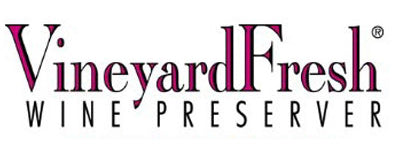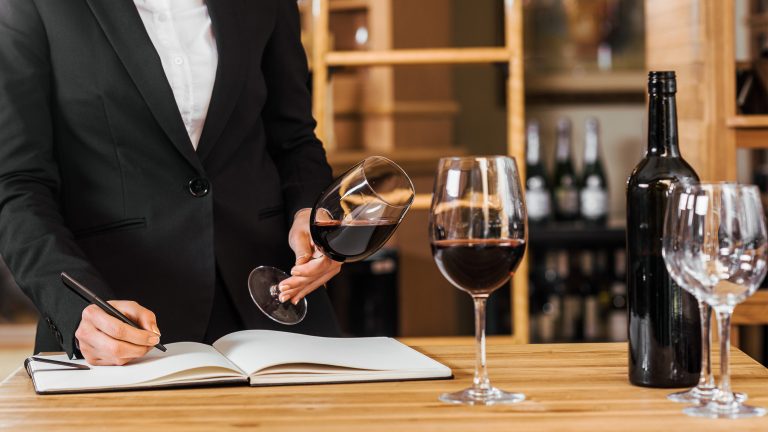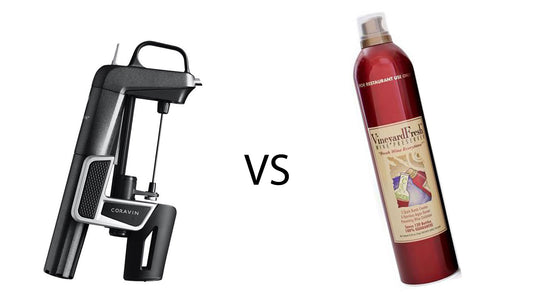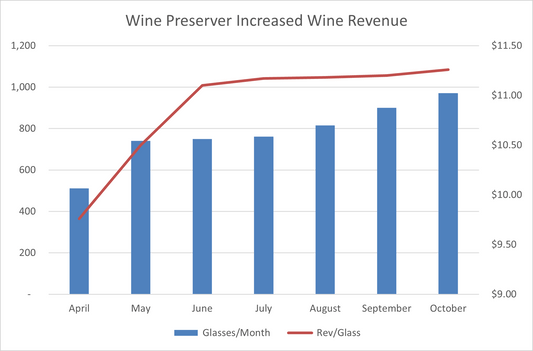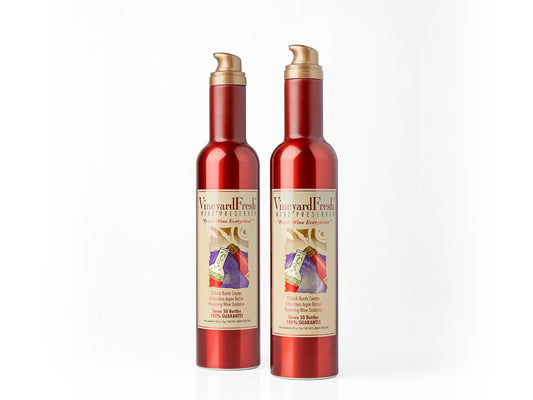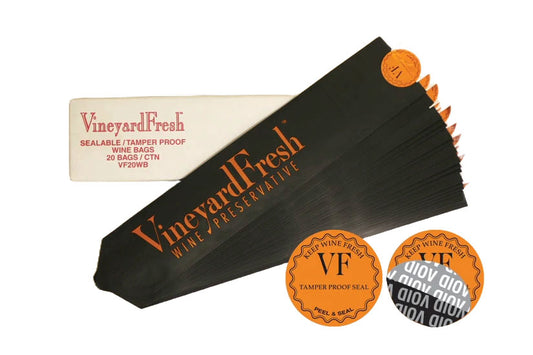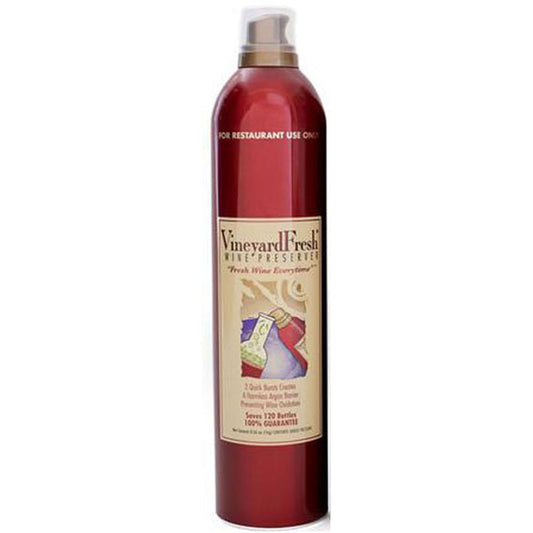As we've covered in previous articles, you can increase your wine revenue by selling more and better quality wine in your restaurant, wine bar, tasting room, or retail store by using wine preservation. And, you can learn about the Top Ways to Preserve Open Bottles of Wine, with any method that uses 100% argon gas to preserve the wine being the best (because it's all about The Science of Argon). You can even learn How to Conduct a Trial of Wine Preservation in your business, so you can see for yourself how well preserving open bottles of wine work to increase your wine revenue.
OK, fine. But, being the shrewd operator that you are, you want to know how much is this going to cost? Is this juice worth the squeeze, so to speak...
Top Wine Preservation Methods: Compare Costs
First, we're going to presume that you've accepted the fact that 100% Argon is the best method to preserve wine. This cost evaluation focuses on the most popular methods in the market used in businesses to deliver argon into open bottles of wine. The 3 main wine preservation methods that use 100% argon are:
- Cabinets (like Napa Technologies)

- Bottle top devices (like Coravin)

- Gas canisters (like VineyardFresh)

What Are All the Costs Involved with Wine Preservation?
There are 3 costs to consider in evaluating a wine preservation system or method. And each of the top methods has a significant difference across the 3 costs. Depending on your business strategy, customer base, available capital, and level of commitment, you can spend quite a bit or money or spend very little money to use wine preservation to increase wine revenue.
The three main cost areas are:
- Capital Expense. This is the initial cost to purchase and install the wine preservation system or device. Depending on the preservation system, the initial capital cost to purchase the cabinet or device can be significant. In some cases, the capital cost just isn't attainable or economically justified.
- Operating Expenses. Two operating expenses to consider - labor and argon. Ease of use, speed of use, simplicity of effort are critical factors affecting the labor cost of using a wine preserver. Labor costs continue to increase, and labor supply is always a challenge for operators. It's important that any preservation method minimize the time and effort required by your wait staff or bar tenders. The cost of argon canisters is the consumable expense. Where, how, how often, and how much does it cost to ensure the supply of argon doesn't run out right when you need it.
- Maintenance and Supplies. Some methods require routine maintenance in between bottles, as well as supplies to ensure the device continues to be effective in preserving wine. Estimating this cost was out of scope for this article, but we know it is complicated to maintain cabinets and devices. Tubes, bottle caps, spouts, and needles all need to be carefully and frequently maintained to prevent wine residue build up or even mold.
How Much Does Each Preservation Method Cost?
Get to the point. See the table below for the 3 main wine preservation methods in the market, the capital and consumable costs described above, and the calculated cost per bottle saved.
As you can see, there is a significant difference is cost per bottle saved across the different methods.
How you think about capital vs operating expense is certainly important, but even if your capital budget is buried in initial construction plans, there is still a significant cost difference in the consumable supplies, let alone the labor / time required to use the methods in a fast paced operating environment.
| Wine Preservation Method | Capital Cost | Consumable | Cost Per Bottle Saved | Labor / Speed and Ease of Use |
| Cabinet (like Napa Technologies) |
$3,000 per 4 bottle unit Est 1,000 bottle life |
$499 for 3 tanks 40 bottles per tank |
Capital $3.00 Consumable $4.16 Total: $7.16 / bottle saved |
Time consuming bottle change process |
| Device (like Coravin) |
$150 Model 3 Est 500 bottle life |
$36 6 cartridges 4 bottles per cartridge |
Capital: $0.30 Consumable: $1.50 Total: $1.80 / bottle saved |
Time consuming pouring process Precise routine maintenance requirements Periodic maintenance and replacement parts required |
| Canister (like Silvadore Wine Preserver) | $0.00 |
$10 per canister 33 bottles per can |
Capital: $0.00 Consumable: $0.30 Total: $0.30 / bottle saved (drops to $0.10 per bottle at Wholesale pricing) |
Fast to Use No maintenance required Easily and quickly preserve multiple bottles at end of shift |
Cost Notes:
- Napa Technology. Cabinets that hold 4 bottles start at $3,000. 3 pack of argon tanks priced at $499, and claimed to preserve 40 bottles each. See here.
- Coravin: Model 3 discounted at $150. Wholesale 6 pack of cartridges are $36, claimed to preserve 4 bottles here.
- VineyardFresh: On Premise size canister, at standard wholesale price of $10 per can.
The Bottom Line on Costs
There is really little question that using Argon Gas Canisters for your wine preserver is the lowest cost solution to save open bottles of wine and increase your wine revenue. There is a place for expensive cabinets - they're beautiful and are part of the bar design and visual aesthetic. But don't expect them to be easy to use or cost effective for preserving many bottles of wine. There is also a place for expensive devices - they're pretty to look at, fun conversation starters, and can make operational sense for a small pour frequency on very high end bottles. But, they're not practical to use across many open bottles of wine, especially if pouring with frequency or operating in a fast paced environment.
There's really only one 100% argon wine preserver that you can implement in your On Premise operation that doesn't require any capital investment, is simple and easy to use with no maintenance or additional supplies required, and is super fast and easy for your staff to use. That is VineyardFresh Wine Preserver.
Have a question or want to talk to Sales? Contact us today.
Safety Note: there are several important safety considerations to factor in when considering these methods. Coravin specifically advises you to put the bottle into their protective sleeve when using, just in case the bottle explodes during use. Napa Technologies has pages of safety warnings regarding sharp elements, electrical hazards, and pressurized gas canisters. Of course, all of the methods can be operated safely with proper training and personel. But, how confident are you that a bottle change or tableside pour will be 100% safe on a late Saturday evening? It worries us a bit.
